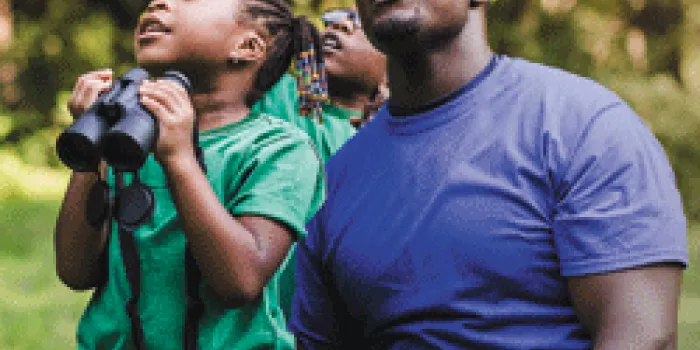Caprice Sauter and her husband, Joe, knew there was a chance that the child she was carrying could have severe hemophilia if it were a boy.
When she was five months pregnant, Caprice’s medical team confirmed the couple’s fear: She was carrying a boy with severe hemophilia B. Joe was concerned: “He was thinking that he and his son wouldn’t be able to do what he was able to do as a kid,” Caprice says.
One month later, the couple’s medical team connected them with the Puget Sound Blood Center in Seattle, which would serve as the family’s hemophilia treatment center (HTC). Instead of only scheduling a list of appointments, they were invited to a different type of meeting—family camp.
Across the country, local National Hemophilia Foundation (NHF) chapters host family camps for children with bleeding disorders, their parents and unaffected siblings. At camp, all family members affected by a bleeding disorder learn, connect and have fun in a safe environment.
Treatment for the soul
When the Sauters were invited to Camp Ivy, hosted by their local chapter, the Bleeding Disorder Foundation of Washington, they expected a clinical setting. “We thought the kids would be in wheelchairs or on crutches,” Caprice recalls. But they saw something totally different. “The kids were doing every summer camp activity you could imagine—swimming, running, basketball, boating. You couldn’t tell who had hemophilia and who didn’t,” she says.
Family camps, which can last a weekend or a full week, are funded by pharmaceutical companies and local chapters. Most are free or low-cost for the families who attend. The schedule mixes fun with education, such as presentations from medical experts and factor infusion training.
At camp, parents can connect with other moms and dads. They can compare notes on treatments, medical advice and how to handle emergencies at home. Parents can also share tips on coping with the social and emotional challenges of having a child with a bleeding disorder.
Most important, at camp kids with bleeding disorders can be kids. Their siblings can get a better understanding of their affected brother’s or sister’s condition, and learn how to be sympathetic and supportive. And their parents can find peace of mind for coping with a child’s bleeding disorder.
The goal of family camps is to build confidence and skills for preventing and treating bleeds. Research shows that it works. Results from a 2013 study in Children’s Healthcare of 102 kids with chronic conditions who attended camp revealed that one of the primary benefits was the ability to develop and achieve personal goals. The campers were better able to develop problem-solving strategies after attending the camp.
Camp is also valuable for parents. Caprice vividly remembers the session that transformed her and Joe’s view of having a child with a bleeding disorder. It was an “Ask the Experts” panel discussion that included teens and young adults with bleeding disorders. One of the panelists was Henry Hudson, an award-winning competitive swimmer at a nearby university. He also had severe hemophilia B, the same bleeding disorder the Sauters’ son Conail would have.
“We asked him everything: about his parents, carrying around factor, even dating,” Caprice says. “He was an amazing example of what our son could be—a college athlete with severe hemophilia.”
The Sauters now take all of their kids to camp—Conail, now 13; his brother Cody, 10, who is unaffected; and younger sister, Callie, 9, who is a symptomatic carrier. “Family camp gave us a light at the end of the tunnel,” Caprice says. “Even though HTC doctors and nurses are there, it’s more treatment for the soul.”
Families gain self-efficacy
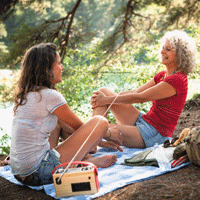
JAG Images/Glow Images
Family camps provide opportunities for families with newly diagnosed children to learn the ropes from experienced families, says Amanda Turner, executive director of NHF’s Central Ohio Chapter. She runs the chapter’s Family Education Camp in Hocking Hill. “New families get so much from the other families who can show them that life will be OK,” she adds.
Like many other camp directors across the country, Turner works with facilitators from GutMonkey, an adventure education company that specializes in developing activities for bleeding disorders camps and other medical programs.
“The work we do is really about self-efficacy,” says Pat Torrey, founder of GutMonkey. His group helps families function better in several different areas, including standing up to stigma, facing challenges and managing healthcare.
Depending on the camp, Torrey’s team organizes supervised adventures, such as ropes courses, kayaking and canoeing trips. Counselors also referee family relay races, sand castle competitions or games that spark intimate discussion. GutMonkey bases the activities on the individual camp’s needs.
With the heightened level of physical activity, it’s inevitable that some kids get bumps and bruises at family camp. “But that’s why the parents are there, to learn how to deal with that,” Turner says.
Feeling unguarded
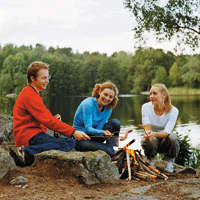
Alexander Benz/Glow Images
In 2010, Carol Firth’s family attended its first family camp with the New England Hemophilia Association (NEHA) in Moultonborough, New Hampshire. Her 10-year-old son, Andrew, was born with severe type 2B von Willebrand disease (VWD). Her daughters, Ciara, 8, and Sarah, 12, are unaffected.
Something changes in Andrew when he is at camp. His social anxiety, fear of being different and shyness slip away. “The environment is so safe and accepting, he feels like he can be unguarded,” says his mom.
Last summer, Andrew performed a funny skit with other kids about an invisible bench. “He looked so natural and at ease,” Carol says. “I think it gave me hope to see that that’s in him.”
Carol enjoys the campfires when the parents gather to relax after a day of fun and education. There are s’mores, songs and more skits. “It’s a safe space to feel understood and accepted,” she says.
Self-infusion boot camp
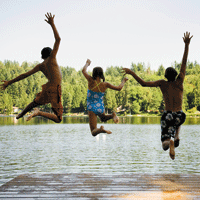
Fuse/Thinkstock
Many family camps invite the clinical staff from HTCs to conduct a session on infusion. Parents who are new to the community can learn, while their kids are trained on how to do it themselves. In the process, kids overcome the fear of self-infusion and gain confidence for infusing when they get back home.
Last year a couple brought their nephew to the camp in Hocking Hill, Ohio. They had just become the toddler’s legal guardians and seemed overwhelmed by their responsibility in caring for his bleeding disorder. The uncle asked to watch infusion training. “By the time I came back, he was sticking someone with a needle,” Turner says. “You could see how excited he was to try something that seemed so intimidating.”
Carol encouraged her older daughter Sarah to learn how to infuse Andrew as a backup. “I told her that if I’m infusing by myself, I may not be as calm, I’d love if you learned as well,” Carol says. So Sarah mastered infusion training at camp and felt proud of herself. “It’s a big comfort to me to know I’m not the only one who can do it,” says her mom.
Caprice calls family camp “self-infusion bootcamp.” One morning before school when Conail was 11, Caprice called him to receive his treatment. “I’ll do it myself,” he answered. That summer, Conail had learned how to self-infuse at family camp. Once home, a nurse at the HTC taught Conail to do it without help, but with supervision. “It’s amazing how much these kids can do,” Caprice says.
Inspirational counselors
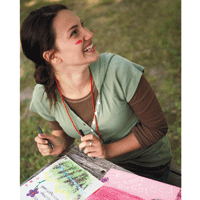
Pauline St. Denis/Glow Images
When Kevin Sorge, executive director of NEHA, was recently asked about the secret to his camp’s success, he didn’t hesitate. “It’s the counselors,” he says.
The chapter’s free family camp recruits about 30 to 40 counselors to help organize the camp’s activities. Many of these counselors have grown up attending the camp. “They remember how nervous or scared they were,” Sorge says. The counselors want to help the next generation of campers with bleeding disorders.
At the NEHA family camp, the counselors divide the younger kids into groups by age, explains Sorge. A group of 6-year-olds may have four counselors between the ages of 16 and 25. “That makes it very conducive to learning,” Sorge says. “A lot of times, the kids will feel more comfortable confiding in the counselor than they will their own parents.”
Having teenage and young adult counselors with bleeding disorders themselves helps build aspiration for the younger kids, says Sorge. Campers see that their counselors are just a few years older than they are, and that they’re managing their condition in high school or college.
“The younger kids are looking into their future and seeing that the future is limitless,” Sorge says.

